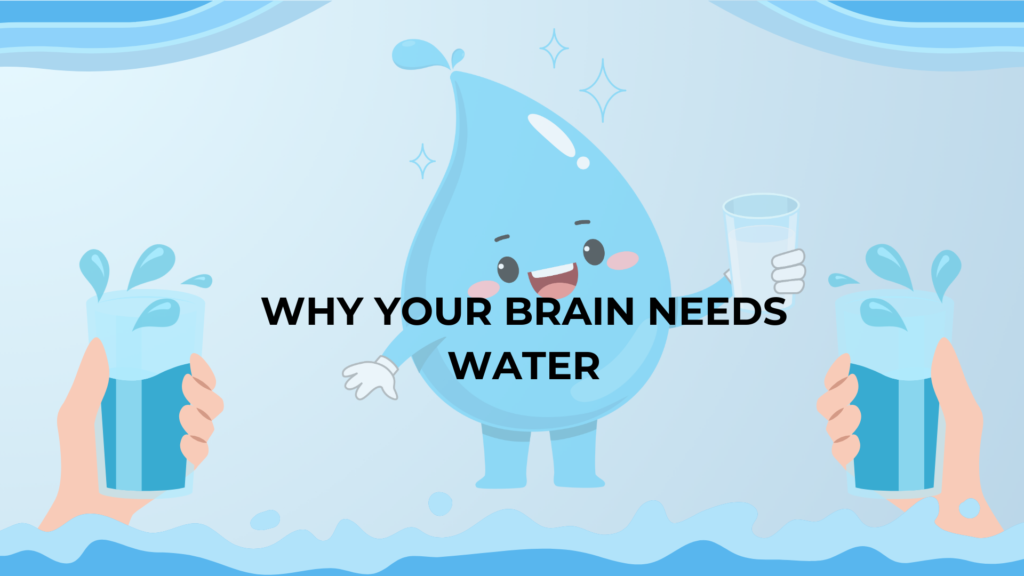Water is crucial for overall health. However, did you know that when you drink it can significantly impact brain function? This concept, known as Neurohydration, suggests that strategic water intake can improve focus, memory, and cognitive efficiency.

Why Your Brain Needs Water
Your brain is composed of approximately 75% water. Even slight dehydration can lead to noticeable cognitive decline. As a result, maintaining proper hydration is essential for:
- Preventing brain fog and mental fatigue.
- Enhancing concentration and alertness.
- Reducing headaches caused by dehydration.
- Stabilizing mood and preventing irritability.
- Boosting overall cognitive performance.
In essence, proper hydration allows brain cells to function at their highest potential. Furthermore, it facilitates the transport of oxygen and nutrients, which helps keep the mind sharp throughout the day.
Best Times to Drink Water for Optimal Brain Function
1. Right After Waking Up
- While you sleep, your body loses fluids, leading to mild dehydration.
- Drinking water first thing in the morning stimulates brain activity and jumpstarts metabolism.
- It also helps flush out toxins accumulated overnight.
- Additionally, adding lemon to your water can provide a boost of vitamin C, which further enhances brain function.
2. Before a Meeting or Exam
- Research indicates that hydrated individuals perform better on memory-based tasks.
- Water enhances reaction time, problem-solving skills, and overall cognitive processing.
- Therefore, drinking a glass of water 30 minutes before a mentally demanding activity can be highly beneficial.
- Moreover, avoiding sugary drinks is advisable, as they can cause an energy crash later.
3. Before a Creative Task
- Creativity relies heavily on strong neural connections.
- Staying hydrated enhances mental flexibility, making it easier to generate innovative ideas.
- On the other hand, dehydration can impair abstract thinking and slow down problem-solving abilities.
- To prevent this, keeping a bottle of water nearby while brainstorming or engaging in creative activities is a great habit.
4. During the Afternoon Slump
- Many people experience a drop in energy levels around 2–4 PM. However, this is often due to dehydration rather than fatigue.
- Instead of reaching for caffeine, drinking cold water can provide an instant boost.
- Water regulates body temperature and increases blood circulation, which helps re-energize the brain.
- Additionally, consuming electrolytes can further enhance hydration and prevent sluggishness.
5. Before Sleep (But in Moderation)
- Hydration plays a crucial role in the brain’s overnight detoxification process.
- A small glass of water before bed aids in flushing out metabolic waste.
- However, drinking excessive amounts may lead to frequent nighttime trips to the bathroom, disrupting sleep.
- As an alternative, herbal teas like chamomile or peppermint can offer hydration while also promoting relaxation.
How Much Water Does Your Brain Need?
While the general recommendation is 2–3 liters per day, individual needs vary based on several factors, including:
- Age and metabolic rate.
- Physical activity levels.
- Climate and environmental conditions.
- Dietary habits, especially salt and caffeine intake.
To determine if you’re drinking enough water, check for signs of proper hydration, such as clear urine and consistent energy levels throughout the day.
Scientific Evidence Behind Neurohydration
Several studies support the link between hydration and brain function. For instance:
- Just 2% dehydration can impair short-term memory, attention, and concentration.
- Hydration enhances neurotransmitter activity, improving learning and mood regulation.
- Drinking water reduces stress by balancing cortisol levels, which helps maintain emotional stability.
- Proper hydration supports optimal brain temperature, preventing mental fatigue and cognitive decline.
Effective Strategies for Staying Hydrated
- Set reminders using a hydration app to track your intake.
- Incorporate water-rich foods such as cucumbers, melons, and oranges into your diet.
- Sip consistently instead of consuming large amounts at once, as rapid intake can dilute essential electrolytes.
Final Thoughts
Hydration is not just about drinking water—it’s about drinking it at the right times. Neurohydration is a simple yet powerful way to optimize brain function, enhance focus, and sustain energy levels. Making minor adjustments in your water intake can significantly impact cognitive performance and overall well-being.
For more details, visit: Vital Cure Insight


